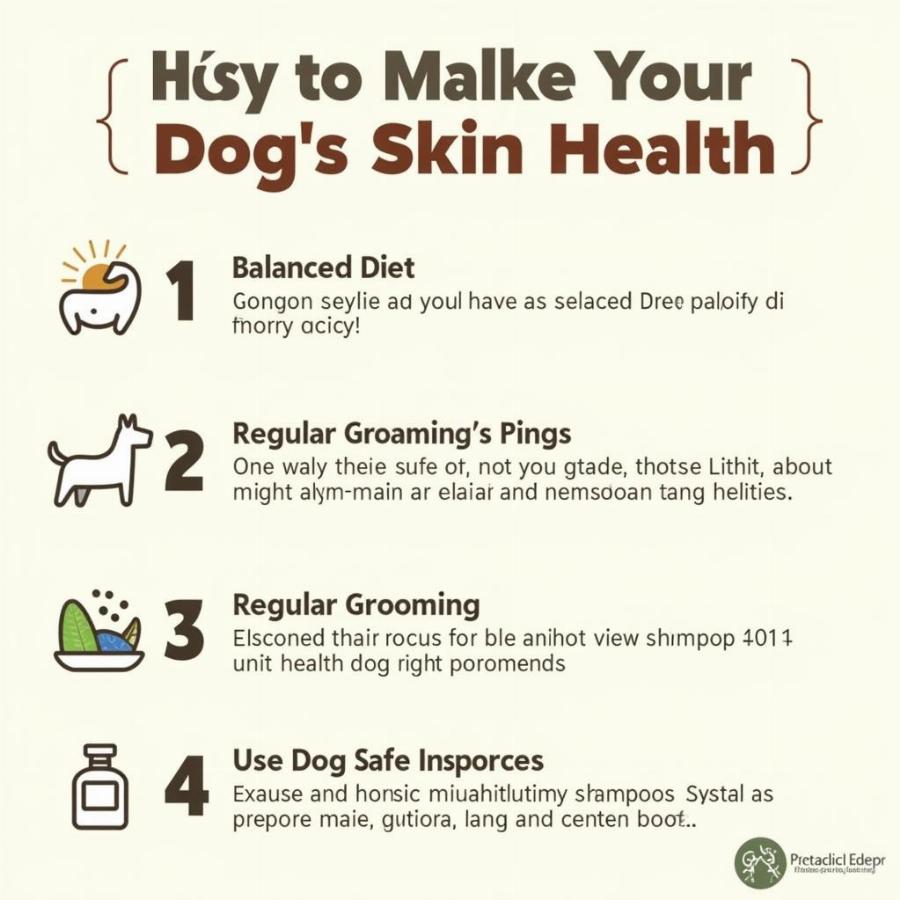Skin tags, those small, benign growths on the skin, are a common occurrence in dogs. While generally harmless, they can be unsightly and sometimes cause discomfort for your furry friend. Understanding why dogs develop skin tags can help you better care for your pet and recognize when veterinary attention might be necessary.
Common Causes of Skin Tags in Dogs
While the exact cause of skin tags isn’t always clear, several factors are thought to contribute to their development:
- Genetics: Some breeds, like Cocker Spaniels, Poodles, and Dachshunds, are more prone to skin tags than others, suggesting a hereditary component.
- Age: Just like humans, dogs tend to develop more skin tags as they age. Middle-aged and senior dogs are particularly susceptible.
- Friction: Skin tags often appear in areas where skin rubs against itself or other surfaces, like the armpits, groin, and neck.
- Obesity: Overweight dogs may develop skin tags due to increased skin folds and friction.
- Viral Infections: Certain viral infections, like papillomavirus, can cause wart-like growths that resemble skin tags.
Identifying Skin Tags on Your Dog
Skin tags typically appear as small, soft, flesh-colored or pigmented growths. They can be flat or raised, round or stalk-like. Most skin tags are painless and don’t cause any discomfort.
However, it’s essential to differentiate skin tags from other skin conditions, such as warts, moles, or even cancerous growths. If you notice any new lumps, bumps, or changes in your dog’s skin, it’s always best to consult with your veterinarian for proper diagnosis and treatment.
When to Worry About Skin Tags
While most skin tags are benign and don’t require treatment, there are a few situations where you should seek veterinary attention:
- Irritation or Bleeding: If a skin tag becomes irritated, inflamed, or starts bleeding, it could indicate an infection or other complications.
- Rapid Growth or Change: A skin tag that suddenly increases in size or changes in color or shape should be examined by a vet.
- Discomfort or Interference: If a skin tag is located in an area where it causes discomfort, rubs against clothing, or interferes with your dog’s movement, your vet may recommend removal.
Treatment Options for Problematic Skin Tags
If a skin tag is causing problems, your veterinarian may recommend removing it. Common removal methods include:
- Surgical Excision: This involves surgically cutting away the skin tag under local anesthesia.
- Cryosurgery: This method uses extreme cold to freeze and destroy the skin tag.
- Electrocautery: This technique uses heat to cauterize and remove the growth.
Your veterinarian will recommend the best removal method based on the size, location, and type of skin tag.
Preventing Skin Tags in Dogs
While you can’t entirely prevent skin tags, especially those caused by genetics or aging, you can take steps to minimize their development:
- Maintain a Healthy Weight: Keeping your dog at a healthy weight can reduce skin folds and friction.
- Regular Grooming: Regular brushing and bathing can help identify skin tags early and prevent matting in areas prone to friction.
- Use a Harness Instead of a Collar: For dogs prone to skin tags on the neck, using a harness can reduce friction and irritation.
Frequently Asked Questions About Dog Skin Tags
Q: Are skin tags contagious?
A: Most skin tags in dogs are not contagious. However, some wart-like growths caused by viruses can be transmitted between dogs.
Q: Can I remove a skin tag myself?
A: It’s not recommended to remove a skin tag at home. Attempting to do so can cause pain, bleeding, and infection. Always consult with your veterinarian for safe and effective removal.
Q: Do skin tags grow back after removal?
A: Skin tags typically don’t grow back after being professionally removed. However, new ones can develop in other areas.
Q: What should I do if I find a new skin tag on my dog?
A: If you notice a new skin tag, monitor it for any changes and consult with your veterinarian during your dog’s next checkup.
 Tips for Dog's Skin Health
Tips for Dog's Skin Health
Looking for More Information on Dog Health?
Check out these related articles on Beaut Dogs:
About Beaut Dogs
Beaut Dogs is your trusted source for all things dog-related! We provide reliable and in-depth information to help you care for your canine companion. For any questions or concerns, please contact us at [email protected].